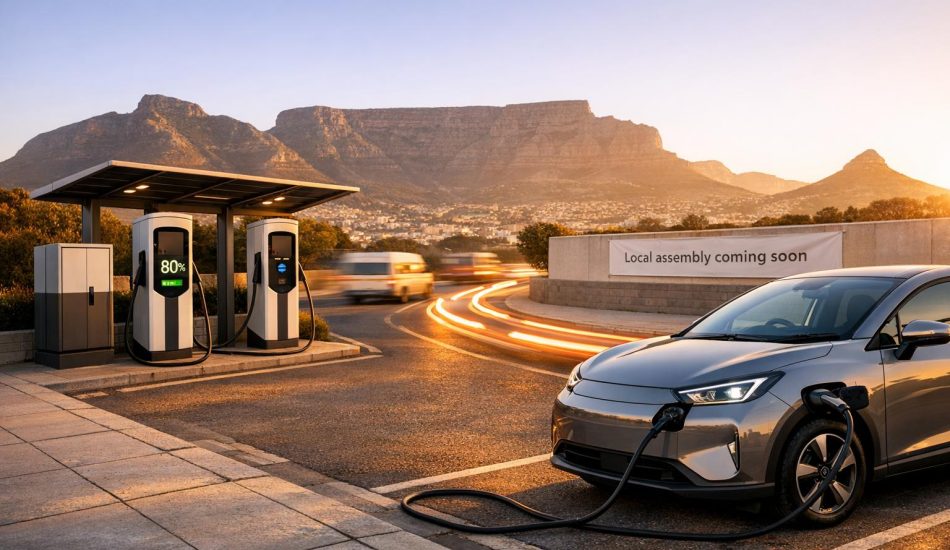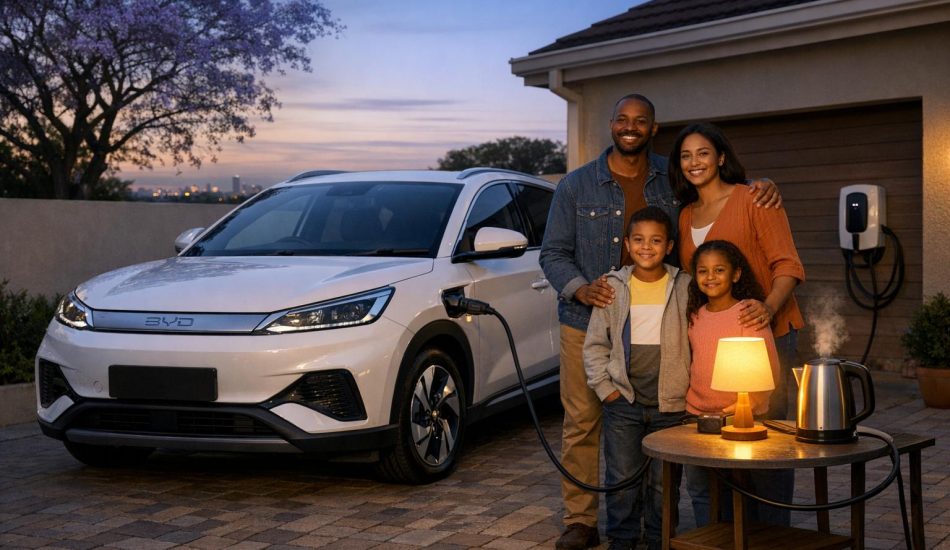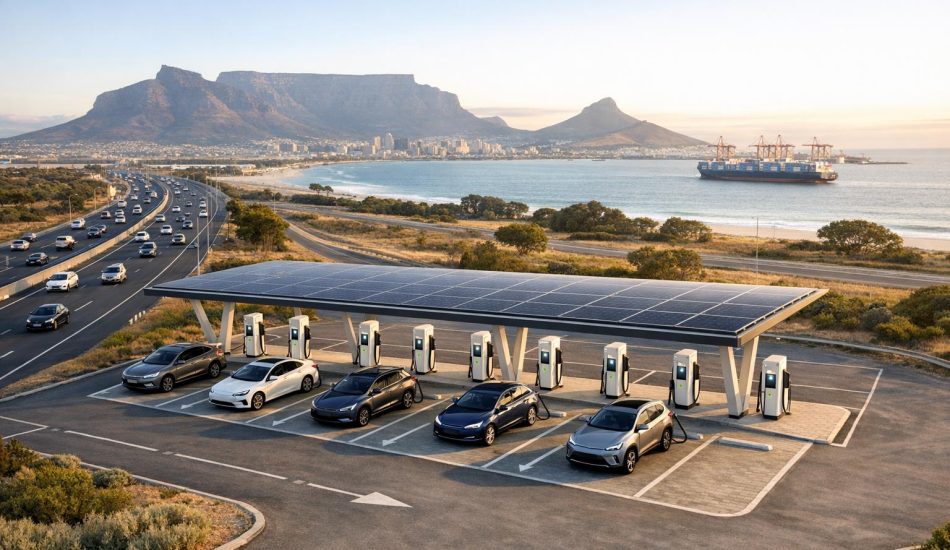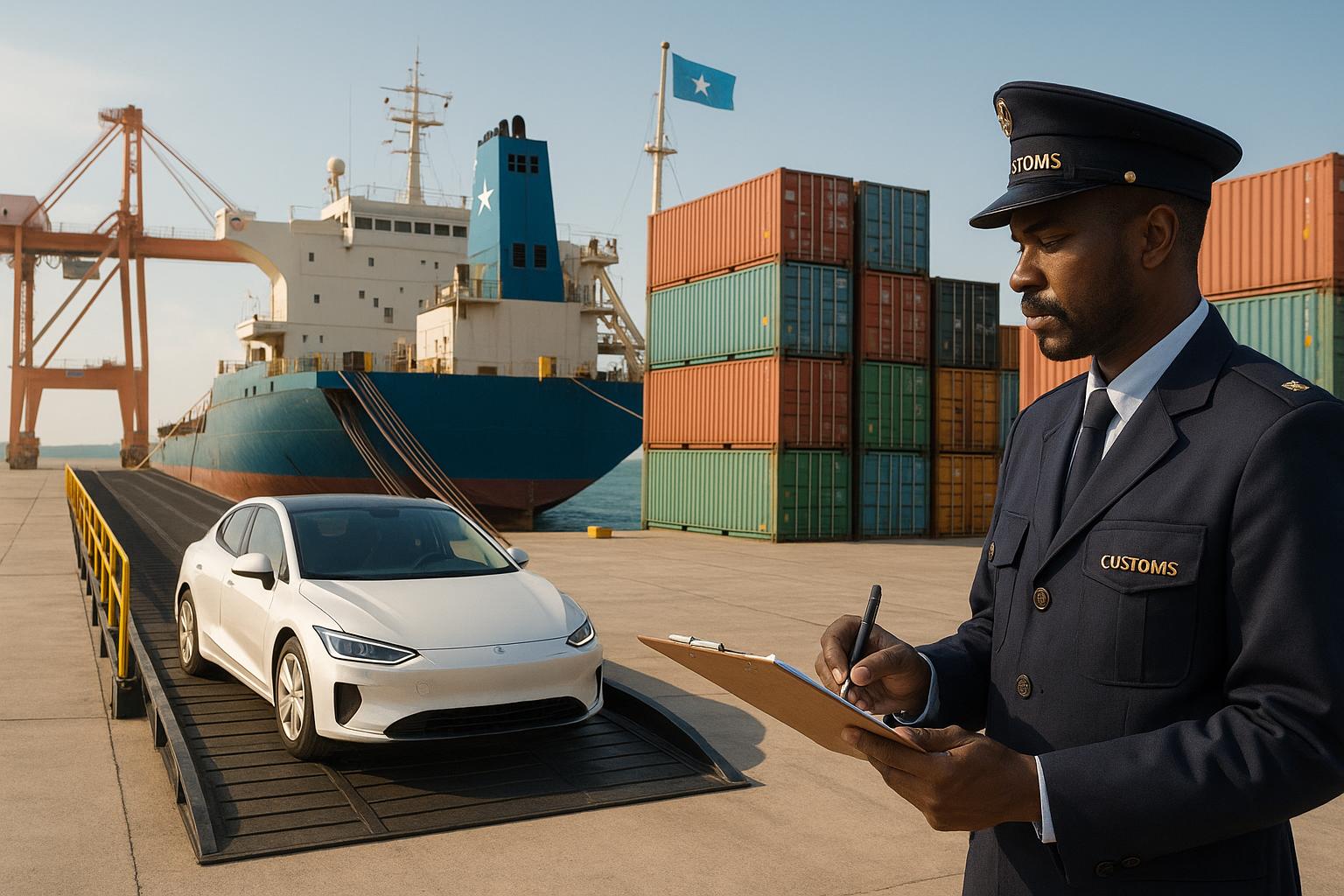
In 2025, Somalia introduced new rules for importing electric vehicles (EVs). These updates aim to modernize transportation and support cleaner vehicle options. If you’re planning to import an EV into Somalia, here’s what you need to know:
- Key Documents: Prepare a commercial invoice, packing list, shipping documents (Bill of Lading or Air Waybill), Certificate of Conformity, Certificate of Origin, Importation Certificate, purchase invoice, and original registration documents.
- Compliance: Ensure the EV meets safety and quality standards, including VIN verification and technical inspections.
- Import Costs: EVs are subject to standard duties, taxes, and VAT. There are no specific incentives or tax breaks for EVs yet.
- Approved Models: Most EV brands like Tesla, BYD, and Volkswagen are allowed, provided they meet safety and documentation requirements.
- Challenges: Customs delays due to documentation errors and limited charging infrastructure are common issues. Planning ahead and working with experts can help.
To simplify the process, platforms like EV24.africa offer vehicle sourcing, customs clearance, and shipping services, making EV imports more manageable.
Somalia’s EV Import Policy Framework
Somalia is gearing up to introduce a regulatory framework for electric vehicle (EV) imports, aiming to modernize its automotive industry and encourage cleaner transportation options. While the full details of the 2025 EV import regulations are still in development, importers should prepare for a system that will likely involve coordination with several government agencies. Below, we break down the key players and the types of vehicles expected to fall under these new rules.
Key Government Agencies and Their Roles
Several government bodies will play a role in overseeing EV imports. Customs authorities will handle clearance processes, licensing organizations will manage permits, and transportation departments will oversee vehicle registration. Importers should stay updated on official announcements to understand how these agencies will work together and what will be required to comply with the new framework.
Vehicle Types Likely to Be Included
The regulations are expected to cover a wide array of EVs, including passenger cars, which are the backbone of the automotive market, and commercial vehicles, increasingly vital due to ongoing economic recovery and the growth of e-commerce. However, the specifics regarding categories and potential exemptions are still pending finalization.
Step-by-Step EV Import Process for Somalia
Bringing an electric vehicle (EV) into Somalia takes some planning, but understanding the process can make it much easier. The journey typically unfolds in three stages: gathering the necessary documents, submitting them correctly, and ensuring compliance with local standards. Let’s dive into the details of what’s required to successfully import an EV into Somalia.
Required Documents for EV Imports
Having the right paperwork is the foundation of a smooth import process. Before your EV can clear customs, you’ll need to assemble several key documents.
Start with a commercial invoice that outlines the essential details of the vehicle, including its make, model, year, VIN, and price in U.S. dollars. Alongside this, prepare a packing list that specifies all items accompanying the vehicle, such as charging cables and user manuals.
For transportation, include the appropriate shipping document: a Bill of Lading for sea freight or an Air Waybill for air freight. These documents confirm ownership during transit and are crucial for customs clearance.
You’ll also need a Certificate of Conformity (COC) to prove that the EV meets international safety and quality standards, along with a Certificate of Origin to confirm where the vehicle was manufactured. In Somalia, an Importation Certificate is a must-have, as it legally authorizes the vehicle’s entry into the country.
Lastly, gather your Vehicle Purchase Invoice and the Original Registration Documents from the country of origin. These verify ownership and provide a record of the vehicle’s history.
Document Submission Process and Deadlines
While Somalia hasn’t set specific deadlines for submitting import documents, it’s wise to file everything well before your vehicle arrives. Early submission can help you avoid delays or extra costs, such as storage fees if your EV is held at customs.
Once your documentation is ready, present it to customs authorities for an initial review. This step ensures that all forms are properly completed. Keep both physical and digital copies as backups to avoid any complications.
After the paperwork is submitted, you’ll move on to the compliance verification stage.
Meeting Quality Standards and Compliance Requirements
This phase ensures that your EV meets Somalia’s safety and quality standards. Once your documents are approved, the vehicle may undergo technical inspections. These inspections typically involve verifying the vehicle identification number (VIN) and checking that the details in your paperwork align with the actual vehicle.
It’s smart to factor in time for these inspections when planning your import timeline. Checking with local authorities about current standards is also a good idea, as requirements can vary.
Since technical regulations often differ across countries, it’s crucial to confirm that your EV model complies with any emerging guidelines specific to Somalia before finalizing your purchase and shipping arrangements.
EV Import Costs, Duties, and Government Incentives
If you’re planning to import an electric vehicle (EV) into Somalia, it’s crucial to have a clear understanding of the associated costs, duties, and any potential government incentives. Proper planning ensures you stay within your budget and comply with regulations.
Import Duties and Taxes for Electric Vehicles
In Somalia, EV imports are subject to the general duties and taxes outlined in the country’s Harmonized Tariff of Customs system. These duties are calculated based on the vehicle’s declared value. Additionally, a Value Added Tax (VAT) is applied, following Somalia’s existing tax framework. Since tax rates and schedules can change, it’s a good idea to check with local customs authorities for the most up-to-date information.
While this tax structure currently applies to EVs, future government policies may introduce changes, especially as interest in renewable energy grows.
Government Incentives and Tax Reductions for EV Buyers
At present, Somalia does not provide specific incentives or tax reductions for importing electric vehicles. Unlike some neighboring countries that have implemented policies like tax breaks or subsidies to encourage EV adoption, Somalia has yet to establish such measures.
However, as renewable energy initiatives continue to gain traction, there’s potential for Somalia to introduce incentives in the future. Until then, importers should plan for the standard duties and taxes without expecting any financial relief from the government.
Cost Comparison: Electric vs. Conventional Vehicles
Under the current regulations, the import costs for electric and conventional vehicles are essentially the same. Below is a quick comparison of key cost factors for both vehicle types:
| Cost Factor | Electric Vehicles | Conventional Vehicles | Note |
|---|---|---|---|
| Import Duties | Standard duty rates | Standard duty rates | Standard rates apply |
| Value Added Tax | Standard VAT rate | Standard VAT rate | Standard rates apply |
For now, there’s no cost advantage in importing an EV compared to a conventional vehicle, at least from a tax and duty perspective.
sbb-itb-99e19e3
Finding EVs and Approved Models for Import
Before importing an electric vehicle (EV) into Somalia, it’s crucial to ensure that the vehicle meets the country’s safety and documentation standards. Once you’ve got a clear understanding of import costs and duties, the next step is finding an EV that aligns with Somalia’s 2025 import regulations.
Approved EV Models for 2025 Import
Somalia’s 2025 EV import regulations don’t restrict specific models, which means most well-known electric vehicles can be imported – provided they meet the necessary safety and documentation requirements. When selecting a vehicle, it’s wise to focus on brands known for their dependability, service availability, and adaptability to local conditions.
Popular choices include models from Tesla, BYD, Volkswagen, and several Chinese manufacturers. These brands are recognized for offering EVs with durable battery systems that perform well in higher temperatures and on challenging road conditions.
To qualify for import, an EV must meet the following key criteria:
- Complete manufacturer documentation.
- Compliance with basic safety standards.
- Proper battery certification.
Chinese EV brands, in particular, have gained popularity due to their competitive pricing and expanding global service networks, making them a practical option for many importers.
Before finalizing your purchase, consult with customs brokers and regulatory agencies to ensure the vehicle complies with the latest requirements. For a smoother sourcing process, consider using specialized platforms designed for EV imports.
Using EV24.africa for EV Sourcing
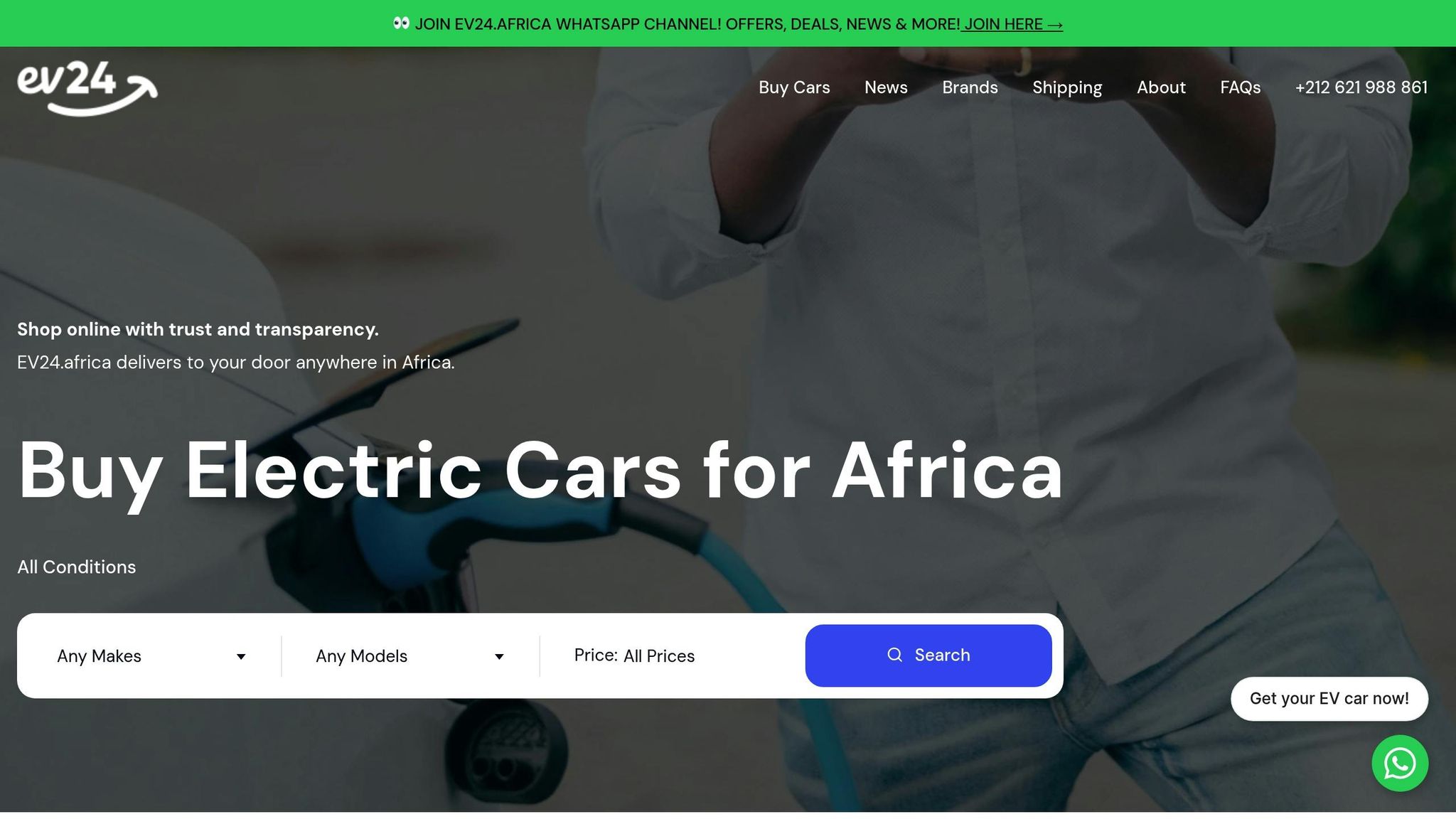
Platforms like EV24.africa simplify the import process by offering comprehensive support, from vehicle selection to delivery.
EV24.africa features a wide range of brands, including Tesla, BYD, Volkswagen, XPeng, Leapmotor, Changan, Wuling, Mercedes-Benz, Citroën, and Peugeot. This variety ensures buyers can find options that suit their budgets and specific needs.
The platform handles compliance tasks, such as customs clearance and local registration, removing much of the red tape that individual importers often face. This service ensures a smoother and more efficient import process into Somalia.
Shipping options include flexible methods like RoRo (Roll-on/Roll-off) or container shipping, which can be arranged port-to-port or door-to-door. This allows buyers to choose the most cost-effective and convenient shipping option based on their location and timeline.
Additionally, EV24.africa offers financing solutions, making it easier to manage the upfront costs of importing EVs.
With operations in all 54 African markets, including Somalia, EV24.africa combines expertise with local knowledge to navigate country-specific import requirements. The platform also provides regularly updated guides on local regulations, ensuring buyers stay informed about any changes in import rules.
Solving Common EV Import Problems
Importing electric vehicles (EVs) into Somalia comes with its fair share of challenges, but most fall into a few predictable categories.
Common Customs Clearance Problems
Customs clearance often becomes a roadblock due to documentation errors. Issues like incomplete manufacturer certificates, incorrect VINs, or improperly completed customs forms can significantly delay shipments. Battery certification documents, in particular, face close scrutiny to ensure lithium-ion batteries meet safety standards.
Valuation disputes are another common hurdle. Customs officials may question the declared value of your EV, especially for used vehicles or imports from regions with different pricing norms. To resolve these disputes quickly, it’s essential to provide detailed purchase invoices, shipping documents, and comparable vehicle valuations.
Partnering with experienced clearing agents familiar with Somalia’s customs requirements can make a world of difference. These professionals can preemptively identify issues and ensure your documentation aligns with what customs officials expect.
Dealing with Limited Charging Infrastructure
Somalia’s EV charging infrastructure is still in its early stages, which poses practical challenges for new EV owners. Without a widespread network of charging stations, careful planning becomes essential.
One solution is to install a Level 2 home charging station, ensuring your EV has a full battery each morning. Qualified local electricians can handle the installation. For longer trips, carrying mobile charging cables can serve as a backup, though these tend to charge more slowly than dedicated stations.
Another strategy is to opt for EV models with extended driving ranges. For instance, the ZEEKR 009 offers an impressive range of 822 kilometers, providing more flexibility between charging stops.
When planning your EV import, consider these practical solutions to address the limited charging infrastructure.
Getting Complete Support Through EV24.africa
Comprehensive support can make the entire import process smoother, and EV24.africa is a platform designed to provide just that. They assist with every step, from selecting the right vehicle to completing registration in Somalia.
"At EV24.africa, we simplify the process of importing and buying electric vehicles in Africa. Our expertise ensures a seamless, transparent, and stress-free experience, so you can focus on driving the future of mobility."
– EV24.africa
The platform handles customs clearance, local registration, and shipping logistics, offering both RoRo and container options to suit your budget and timeline. With experience in Somalia’s ports, EV24.africa ensures efficient port-to-port or door-to-door delivery.
They also offer financing solutions to help manage upfront costs like import duties, shipping fees, and even home charging station installations. This makes EV ownership more accessible, even for those needing to invest in additional infrastructure.
Key Points for Importing EVs into Somalia
Bringing electric vehicles (EVs) into Somalia under the 2025 regulations requires a well-thought-out approach, focusing on documentation, compliance, and financial planning. Ensuring you have complete manufacturer certificates and precise customs declarations is essential to avoid delays and streamline the process.
Different government agencies handle specific aspects of the import process, so it’s important to know what documents are required by each authority and submit them on time. While import duties and taxes can add to your costs, Somalia offers incentives for EV imports, making them a more cost-effective choice compared to traditional vehicles.
Financial preparation is another critical factor. Somalia’s current charging infrastructure presents challenges, so planning ahead is key. Installing home charging stations and opting for EVs with longer ranges are practical ways to address these limitations.
Keep in mind that the total cost of importing an EV goes beyond the sticker price of the vehicle. Expenses such as import duties, shipping fees, customs clearance, and investments in charging infrastructure all add up. However, the long-term savings on fuel and maintenance can make EVs an appealing option for importers.
Collaborating with experienced partners can simplify the entire process. For instance, platforms like EV24.africa offer end-to-end services, including vehicle sourcing, customs clearance, and local registration. They provide flexible shipping options, transparent pricing without hidden fees, and financing solutions to make EV ownership more accessible. With expertise across all 54 African markets, including Somalia, they are well-equipped to navigate the specific requirements and challenges you might encounter.
FAQs
What future government incentives could reduce the cost of importing electric vehicles into Somalia?
While Somalia hasn’t officially announced future government incentives for importing electric vehicles (EVs), there’s a possibility that policies aimed at reducing costs could emerge. Neighboring countries have implemented measures like tax breaks on EV components and reduced import duties, which might inspire Somalia to follow a similar path to promote EV adoption.
Should such incentives come into play, they could dramatically cut import costs, making EVs a more viable option for both individuals and businesses. Keep an eye on updates from Somalia’s regulatory bodies to stay informed about any new developments or policies.
What steps can importers take to avoid customs delays and documentation issues when bringing EVs into Somalia?
When importing EVs into Somalia, it’s crucial to have all your paperwork in order to avoid customs delays and potential documentation hiccups. The essential documents include a commercial invoice, packing list, and transportation paperwork like a Bill of Lading or Air Waybill. Additionally, you’ll need an import permit from the Ministry of Trade and a Certificate of Conformity (COC) for new or nearly new EVs to ensure they comply with Somali standards.
To make the process smoother and minimize errors, you might want to partner with a licensed customs broker. They can handle document submissions, address any issues during the clearance process, and help you avoid unnecessary delays or penalties.
How can EV owners in Somalia manage limited charging options and keep their vehicles running efficiently?
To manage Somalia’s sparse charging infrastructure and keep your EV running smoothly, there are a few practical steps you can take. Start by planning your charging routine thoughtfully. Look for available charging spots in your area and, if possible, set up a home charging station to make things easier. Next, make sure your EV aligns with Somalia’s technical standards and import regulations to avoid any compliance issues. Lastly, think about investing in portable chargers or solar-powered systems to minimize dependence on public charging facilities.
By staying updated on local advancements and taking these steps, you can navigate the challenges and enjoy a more seamless EV experience.


